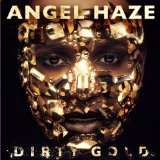 Angel Haze is an exciting prospect. The 22 year old rapper and sometimes singer from Detroit’s flow is like an exhilarating and effortless amphetamine hit; you hear her, you sit up and you ask ‘who?’ Her story is one of cult religions, abuse and an exploration of her sexuality and sexual orientation and how all of these things have resolutely not made her into a victim. After several mix tapes it was 2012’s unexpectedly diverse and brilliant “Reservation” and her covers EP “Classick”, both exploring all of these experiences, that guaranteed she could no longer go unheard. Her biggest hit to date, the skeletal and booming “New York” has now become a club essential and a classic in itself. So why exactly does “Dirty Gold”, Angel Haze’s first official album release sound like such a step backwards?
Angel Haze is an exciting prospect. The 22 year old rapper and sometimes singer from Detroit’s flow is like an exhilarating and effortless amphetamine hit; you hear her, you sit up and you ask ‘who?’ Her story is one of cult religions, abuse and an exploration of her sexuality and sexual orientation and how all of these things have resolutely not made her into a victim. After several mix tapes it was 2012’s unexpectedly diverse and brilliant “Reservation” and her covers EP “Classick”, both exploring all of these experiences, that guaranteed she could no longer go unheard. Her biggest hit to date, the skeletal and booming “New York” has now become a club essential and a classic in itself. So why exactly does “Dirty Gold”, Angel Haze’s first official album release sound like such a step backwards?
It may take a while to pull your already-established fan base along with you, but the decision to move from the relatively underground to the mainstream is not necessarily bad. It’s apparent after hearing the opening track, the scene-setting “Sing About Me” that Angel Haze wants to make it big as a crossover act; not as a rap artist or a hip-hop artist but as a pop star. Listening to recent interviews and the snippets of dialogue contained through “Dirty Gold” this indeed would appear to be Haze’s choice. Beginning with a sung chorus, shimmering synths and a repetitive R2D2 whistle, “Sing About Me”, is uplifting and pleasant but completely derivative r’n’b pop. With sing-song rapped verses, Haze encourages us to celebrate her success and this formula of sung chorus and rapped verse is repeated almost throughout the entirety of the tracks on “Dirty Gold”. On the third song, “A Tribe Called Red”, a trapped-out and dub-stepped rhythm supports Haze’s rap spit efficiently enough but then is completely compromised and crushed by the excruciatingly heavy-handed (sung) chorus telling the listener ‘Don’t give up…turn it around’. It already sounds dated; the EDM ticks, the histrionics and the self-empowering sentiment.
As if any further confirmation were required, the presence of omnipresent songwriter and pop star in her right, Sia, both singing and writing on “Battle Cry” (the hands in the air chorus actually states ‘lift your hands towards the sky’) and with production by equally in-demand Greg Kurstin (Kylie, Britney and Lily Allen), there is no doubt that Haze is aiming stadium big. But even with such dependable collaborators the overall sound of this is overwrought and clichéd, particularly in the slower and more ‘serious’ second half. The most obvious comparison is that of Nicki Minaj who, like Haze, released early mix tapes and through thunder-stealing features proved herself as a gloriously eccentric, genuinely witty and charismatic performer and then her debut “Pink Friday” appeared and it was sonically safe, overly sentimental and, worst of all, dull. The Minaj that was initially promised was not the Minaj delivered and the Angel Haze that we expected has similarly been mislaid somewhere in transit.
There are moments of “Dirty Gold” that do work well within this new format. The first single taken from the album, the Markus Dravs-produced (Bjork, Arcade Fire and Coldplay, amongst others) “Echelon (It’s My Way)” sounds fresh and relevant. It has the best chorus on “Dirty Gold” by some distance and its trap styling and deceptively shallow subject matter (fashion, basically) are pretty perfunctory – it’s pretty much the second instalment to ASAP Rocky’s “Fashion Killa” – but on an album that is looking for instant pop gratification and perfect hooks this does the trick very well. “Deep Sea Diver” has a tight groove and throbs and rattles like prime time Missy Elliott and “White Lilies/White Lies” has breadth and an epic feel that moves away from the more predictable structures found here with the spaghetti western-type loop and long instrumental fadeout adding atmosphere.
It’s maybe important to point out that the deluxe version of this album, and I am loath to review these ‘versions’, which are essentially just marketing tools and undoubtedly cynical, contains four of the most compelling, sonically-challenging and vibrant tracks contained under the “Dirty Gold” banner. Admittedly one of these is the previously-released “New York”, but listen to the baroque and oddly beautiful “Rose-Tinted Suicide” and marvel at what could (should) have been achieved. The decision to still include these tracks, albeit in this unabridged version of the album, confirms that the young star’s talent is still very much intact. It might be of course that Angel Haze herself wants to distance herself from these more nuanced and disturbing tracks but one can only hope that she changes her mind and finds again the bright light that’s hidden beneath the dirt here, the one that attracted us to her in the first place. The three-star rating is based on the Deluxe Edition.


